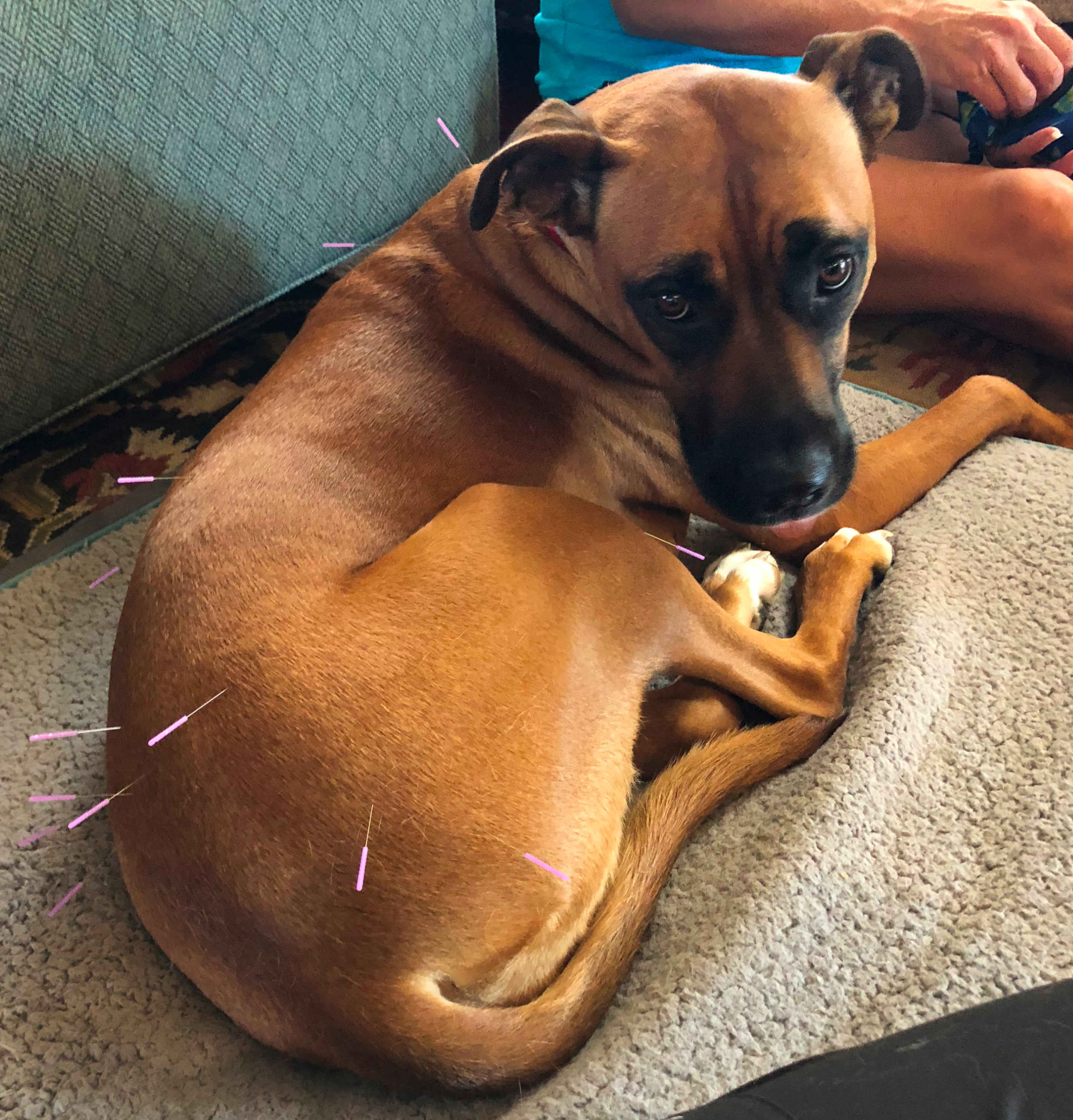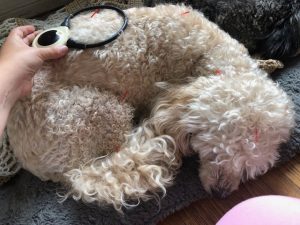 Studies have shown acupuncture to decrease pain and inflammation, improve arthritis, neurological and spinal cord issues such as weakness and difficulty walking, relieve behavioral issues such as anxiety, dermatological conditions such as itching and inflammation, gastrointestinal issues such as vomiting, diarrhea, and poor appetite, as well as boost the immune system.
Studies have shown acupuncture to decrease pain and inflammation, improve arthritis, neurological and spinal cord issues such as weakness and difficulty walking, relieve behavioral issues such as anxiety, dermatological conditions such as itching and inflammation, gastrointestinal issues such as vomiting, diarrhea, and poor appetite, as well as boost the immune system.
 Traditional Chinese Veterinary Medicine has been used for several thousands of years, and treats the body, mind, and spirit as a whole. Acupuncture is one of the five components of Traditional Chinese Medicine. The other four components are herbal medicine, food therapy, Tui-na massage/body work, and Qi Gong movement. Acupuncture works best to contribute to a healthy and balanced life when used in combination with these other four components.
Traditional Chinese Veterinary Medicine has been used for several thousands of years, and treats the body, mind, and spirit as a whole. Acupuncture is one of the five components of Traditional Chinese Medicine. The other four components are herbal medicine, food therapy, Tui-na massage/body work, and Qi Gong movement. Acupuncture works best to contribute to a healthy and balanced life when used in combination with these other four components.
How Does it Work?
 Classical Chinese theory explains that energy flows throughout the body through channels, or meridians that connect all the organs and systems that sustain life. These pathways of energy are inter-connected, inter-dependent and inter-related. What that means is, something that affects the energy of one pathway will have an impact on the other channels as well. By stimulating specific points along the channels, balance and harmony can be restored.
Classical Chinese theory explains that energy flows throughout the body through channels, or meridians that connect all the organs and systems that sustain life. These pathways of energy are inter-connected, inter-dependent and inter-related. What that means is, something that affects the energy of one pathway will have an impact on the other channels as well. By stimulating specific points along the channels, balance and harmony can be restored.
Scientific research has demonstrated that stimulation of acupuncture points results in a release of neurohormones (such as endorphins). This has an analgesic effect as well as an effect on other multiple systems of the body, which elevate mood and relieve pain.
In Acupuncture, the energy flow along a meridian channel is manipulated through the insertion of small, thin, sterile needles, less than half the width of a regular sewing needle into body tissue where nerve bundles and blood vessels come together. These collections of nervous and vascular tissue are termed “acupuncture points.”
The ancient Chinese discovered 361 acupoints on humans and 173 acupoints in animals.
Acupuncture Physiology
When an acupuncture needle is placed, it strengthens the body’s ability to heal itself:
- muscles around the needle relax
- blood flow and oxygenation increase
- removal of metabolic waste is improved
- creates a local and generalized pain-relieving effect
- stimulates the nervous system
- release of endorphins and neurotransmitters such as serotonin and dopamine from the brain, which modulate pain, inflammation, metabolism, and the immune system.
Unlike medications, acupuncture has minimal risk of adverse symptoms, and does not interact with any other medications or supplements. Acupuncture can be used alone, or in combination with Western or herbal medications and can at times help to decrease the dose of Western medication that an animal requires.
Click here to view a video on acupuncture from the Chi Institute of Traditional Chinese Veterinary Medicine, where Dr. Harrison studied.
Scheduling Acupuncture
 The schedule can be flexible depending on the needs of the pet and their caregivers.
The schedule can be flexible depending on the needs of the pet and their caregivers.
Acupuncture treatments are initially recommended to be 1-2 times per week, then usually taper to once per week, then every 2 weeks, and then once per month for maintenance once the issue is resolved. 6-9 sessions are typically needed to see maximum effect of acupuncture, but response varies quite a bit depending on the patient, as well as the chronicity and nature of the condition.
Dr. Harrison has patients that see her for acupuncture anywhere from once per week to once per month for maintenance and general well-being. There is no harm in continuing acupuncture even more frequently, if you chose to do that. In China, the acupuncture prescriptions are daily!
Is there scientific evidence on how acupuncture works?
Modern research shows that acupoints are located in the areas where there is a high density of free nerve endings, mast cells, small arterioles and lymphatic vessels. A great number of studies indicate that the stimulation of acupoints induces the release of beta-endorphins, serotonin, and other neurotransmitters. The US National Institute of Health’s National Library of Medicine has a total of 25,764 research papers regarding acupuncture and 404 animal specific articles as of February 2017.
Here are a few interesting scientific studies:
Electroacupuncture Promotes CNS-Dependent Release of Mesenchymal Stem Cells
Hypothalamus and Amygdala Response to Acupuncture Stimuli in Carpal Tunnel Syndrome
If you have any questions about our services, please contact us using the form below.
